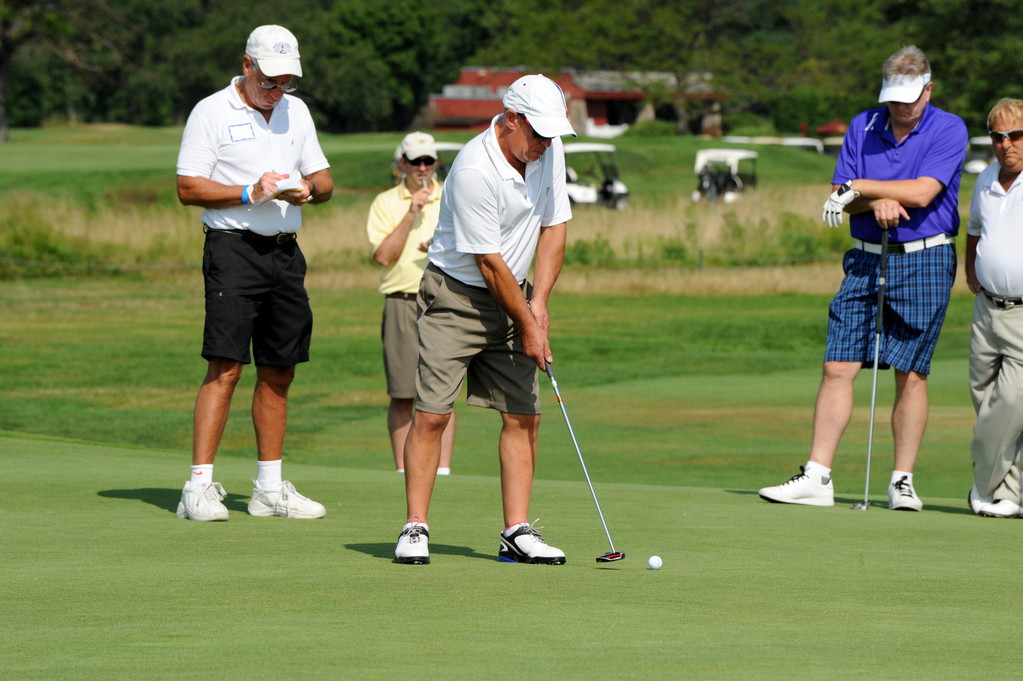Rockville Centre resident competes in golf tournament for the blind
Ted Fass’s first swing at the seventh hole sent the ball sailing down the middle of the fairway on a picturesque Monday morning. After a couple of practice swings, his follow-up shot put the ball on the green, and a long putt would give him a par for the hole.
The casual observer might not have realized that Fass couldn’t see the results of his shots — or, for that matter, the course. Fass is blind, as were the rest of his 24 competitors at the 67th annual United States Blind Golf Association’s national championship, held at Oceanside’s Middle Bay Country Club Aug. 6 and 7.
Fass’s putt broke just left of the hole, and continued rolling. His next one didn’t fare much better. His short game — chip shots from uneven lies and putts — is his biggest challenge, he said.
David Santucci, Fass’s coach, agreed. “The short game is where I come in most,” Santucci said. “I’m kind of, in a sense, his eyes out there. It’s like a caddie, plus.”
In the USBGA, a coach takes on many of the duties of a caddie, offering advice on each shot and helping the golfer decide which club to use. The coach also tells the competitor how far he or she is from the hole, describes the terrain, positions the club in front of the ball in preparation for the swing — and drives the cart.
Fass said that he counts steps with Santucci as they discuss how long a putt is. “The coaches, they’re an important piece,” Fass said. “The communication is the key. It’s really two people playing when I’m in the green.”
The next hole was equally difficult for Fass, but after his first shot left the ball on an uneven lie, he managed to get back on the fairway with his second effort. “That’s what I was aiming for,” he joked as onlookers offered their compliments.
For the first decade of his life, Fass could see, but when he was 11, a complication in one of many surgeries to remove a tumor from his nasopharynx left him without sight. According to Fass, who is now 60, the hardest part of the adjustment was the response of his friends, many of whom had moved on to the next grade while he was in the hospital.
“In the beginning, nobody wanted to be friendly with a blind person because to hang out with them was a responsibility,” he said. “I made it where it wasn’t any kind of obligation.”
Despite his disability, Fass is extremely self-sufficient, forgoing the use of a cane or a guide dog. After he finished the first round of the tournament, he was asked for, and gave, perfect directions to a man who could see just fine.
Described by his wife, Gail, as an athletic person, Fass has a variety of hobbies, including water-skiing, swimming and managing a blind baseball team. When his sister gave him a driver 10 years ago, he started going to a driving range and working with PGA trainer Ronnie Wright.
There are three categories of competitors in blind golf competition: B1, B2 and B3. Those in the B1 category, like Fass, have little to no light perception, while the B2s and B3s have some vision.
Fass, the 2012 championship co-chair, was instrumental in bringing the tournament to Middle Bay, where he is a member. The championship had never been held at a private golf course, he said.
Most of the fundraising for the event, which cost about $40,000, was done through events Fass organized, like a Rock On to Tee Off concert in June in Bellmore. He said he raised nearly $22,000, while another golfer in the tournament helped raise $15,000. The USBGA paid the rest.
The first day of competition was shortened by bad storms the previous night. The ninth hole was Fass’s last of the day, and he was less than impressed by his performance. “[I was] frustrated, because I know I can play better,” he said. “It just wasn’t my day. I’ll make it up tomorrow.”
He fared much better on Day Two, and won the Boswell Award, beating 15 competitors in his category for the low net, or post-handicap, score.
According to Fass, the tournament was a success, and the golfers enjoyed it. Sheila Drummond, the other co-chair, described it as a cruise ship on land. Others expressed their hope that tournaments like this one would bring more attention to blind golfers.
“A message needs to get out there,” said Ronnie Wright. “We have all different types of golfers, and we just have to get the message out to everyone.”






